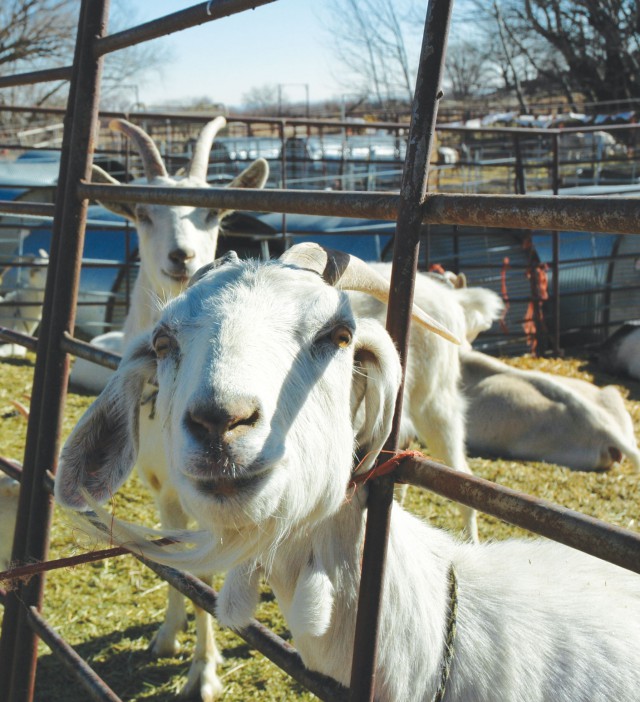
Mike MacKinnon leads Christie into a small room and up onto a platform, where her neck is harnessed to keep her in place. Then he grabs a clean pail, pulls up a stool and begins to milk the French Alpine dairy goat, which recently gave birth at Frog Belly Farm in Longmont.
But this is no ordinary dairy. The process of making this milk ready to drink is almost over, and includes running the liquid through a strainer, and then chilling it in the farm’s walk-in refrigerator before bottling. The folks at Frog Belly Farm prefer their dairy raw rather than pasteurized.
“Everything you need is in raw milk,” farm owner MacKinnon says during a tour of his property. MacKinnon sells shares of his 35-goat herd — the only legal way to buy or sell raw milk in Colorado — to about 40 local shareholders. Frog Belly Farm is one of just three dairies in Boulder County — and 47 in the state — on the Raw Milk Association of Colorado’s membership list. Membership is not mandatory, but the numbers are still a clear indicator that raw-milk drinkers are in the minority. Access, or lack thereof, to raw dairy is an obvious obstacle. But advocates face a huge uphill battle when it comes to shaking the stigma of raw milk as unsafe.
“The government tells us not to drink raw milk; it’s been so demonized,” MacKinnon says.
The majority of milk we drink has been collected in mass quantities by machine and pasteurized — a process involving heating the milk to rid it of bacteria and potentially harmful pathogens. Government entities, including the Food and Drug Administration, the U.S. Department of Agriculture and the Boulder County Public Health Department, say milk is safer this way. Others, like MacKinnon, disagree, and even argue that the pasteurization process removes many of the healthful proteins and vitamins found naturally in milk.
“When they pasteurize milk, they take all the good stuff out and then they try to put it back in,” says Rick Jones, owner of Custom Nutrition and Exercise in Boulder. “It’s no longer in its natural state. When they put the vitamins and hormones back in, you’re not getting as good of a quality of milk. People often have a harder time digesting it.”
His opinion is in line with those of the Weston A. Price Foundation, a nonprofit with chapters all over the world that encourages the safe consumption of raw milk.
“There are many health benefits to consuming raw milk,” says the foundation’s website. “Early studies showed that children consuming raw milk had greater resistance to disease, better growth and stronger teeth than children consuming pasteurized milk.”
But that’s one group that Lane Drager, consumer protection program coordinator for Boulder County’s Public Health Department, says shouldn’t drink raw milk.
“Raw milk, from our standpoint, always has significant risk,” Drager says. “It’s particularly dangerous for people who are at higher risk — young children, pregnant women, older people.”
The last known Boulder County outbreak of an illness linked to raw milk was in 2010, when the now-defunct Billy Goat Dairy in Longmont allegedly caused 30 cases — 11 of them confirmed in the lab — of infections of E. coli and/or Campylobacter. Symptoms of a Campylobacter infection are similar to those of food poisoning. Pasteurization kills the bacteria. Two people endured extended hospitalizations.
“I don’t doubt that the people who consume raw milk believe there are positive impacts, but there are no studies to back that up,” Drager says. “I do know what it can do — it can kill people or make people very, very ill.”
Drager says greater county regulation wouldn’t really help.
“I don’t think we could ever get there,” Drager says. “Without that pasteurization step, the most critical step, it’s never going to be completely safe.”
Despite the warnings against consuming raw dairy, MacKinnon maintains that it is not only his choice but his right to choose what he puts into his body.
“It’s right for me. I drink it,” he says. “But I believe it’s up to the individual to make that decision, to do the research and decide if it’s right for them.”
MacKinnon set up his operation following guidelines from the Raw Milk Association of Colorado. The organization’s mission is to unite producers and consumers, while creating standards for sanitation, testing and distribution that will help ensure the quality of raw milk available in Colorado. Even so, with no oversight committee or inspections, MacKinnon encourages those interested in buying a share of a goat or cow to visit the farm and get to know the farmer.
“I have visited some farms where I would not want to drink the milk they produce,” he says. “We’re pretty fastidious about our cleaning operations.”
Drager says this idea is nice, but it won’t beat pasteurization when it comes to keeping the milk safe.
“Really make sure you know what you’re drinking,” he advises. “Just saying, ‘I know the farm it’s from, I’ve been out there and it looks like they’re running a good operation and they’re really nice people,’ that doesn’t mean they can’t make a product that will make you very, very ill.”
MacKinnon says the benefits of raw milk outweigh the extra work.
“I have to live in the world, not separated from it,” MacKinnon says, explaining the driving force behind his decision to become a farmer. “I do it because I love raw milk — I want to drink it.”
Respond: [email protected]














